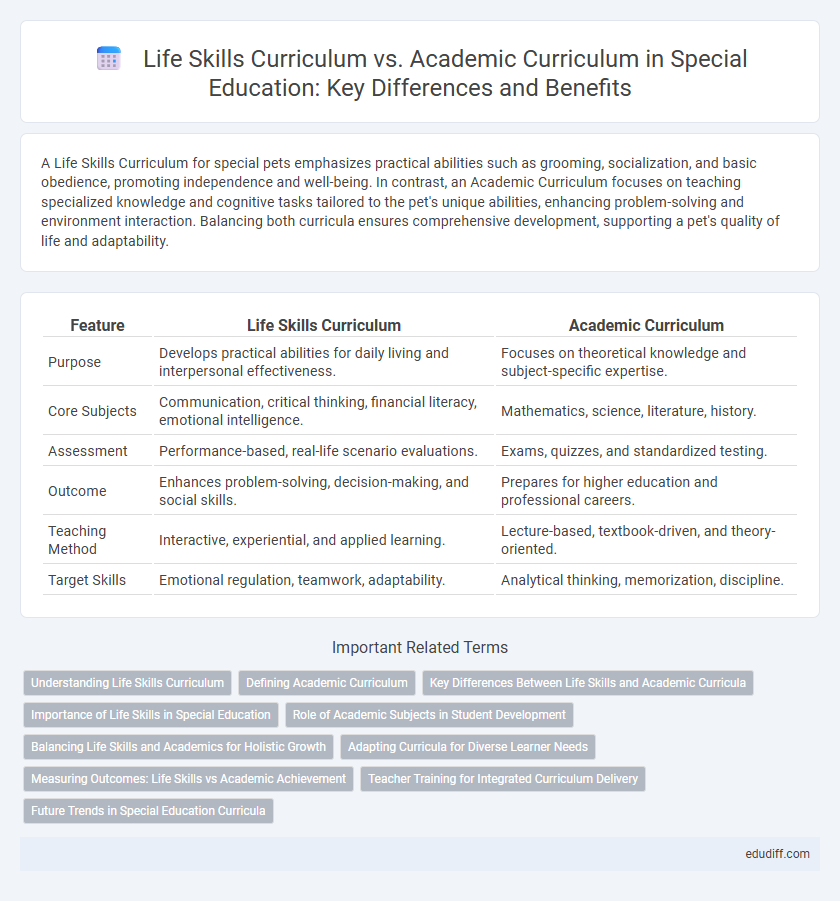A Life Skills Curriculum for special pets emphasizes practical abilities such as grooming, socialization, and basic obedience, promoting independence and well-being. In contrast, an Academic Curriculum focuses on teaching specialized knowledge and cognitive tasks tailored to the pet's unique abilities, enhancing problem-solving and environment interaction. Balancing both curricula ensures comprehensive development, supporting a pet's quality of life and adaptability.
Table of Comparison
| Feature | Life Skills Curriculum | Academic Curriculum |
|---|---|---|
| Purpose | Develops practical abilities for daily living and interpersonal effectiveness. | Focuses on theoretical knowledge and subject-specific expertise. |
| Core Subjects | Communication, critical thinking, financial literacy, emotional intelligence. | Mathematics, science, literature, history. |
| Assessment | Performance-based, real-life scenario evaluations. | Exams, quizzes, and standardized testing. |
| Outcome | Enhances problem-solving, decision-making, and social skills. | Prepares for higher education and professional careers. |
| Teaching Method | Interactive, experiential, and applied learning. | Lecture-based, textbook-driven, and theory-oriented. |
| Target Skills | Emotional regulation, teamwork, adaptability. | Analytical thinking, memorization, discipline. |
Understanding Life Skills Curriculum
Life Skills Curriculum emphasizes practical abilities such as communication, problem-solving, and emotional intelligence, which are essential for personal and social development. Unlike academic curricula that focus on theoretical knowledge and cognitive skills, life skills education prepares students to navigate real-world challenges and foster resilience. Integrating this curriculum enhances students' adaptability and promotes holistic well-being beyond traditional academic performance.
Defining Academic Curriculum
Academic curriculum refers to a structured set of educational courses and content designed to develop foundational knowledge and intellectual skills in subjects like mathematics, science, language arts, and social studies. It emphasizes theoretical understanding, critical thinking, and mastery of core academic standards essential for standardized testing and higher education. This curriculum prioritizes measurable academic outcomes aligned with national or state educational frameworks.
Key Differences Between Life Skills and Academic Curricula
Life Skills Curriculum emphasizes practical abilities such as problem-solving, communication, and emotional intelligence, while Academic Curriculum focuses on theoretical knowledge and subject-specific content like mathematics, science, and literature. Life Skills education aims to prepare students for real-world challenges through experiential learning, whereas Academic Curriculum prioritizes cognitive development and mastery of standardized curricula. The key difference lies in the application of knowledge versus acquisition of knowledge, with Life Skills fostering adaptability and personal growth, and Academic Curriculum targeting intellectual achievement and credentialing.
Importance of Life Skills in Special Education
Life skills curriculum in special education equips students with practical abilities such as communication, self-care, and social interaction, which are essential for independent living and community integration. Unlike academic curriculum that emphasizes cognitive knowledge, life skills focus on real-world application and functional development, helping students navigate everyday challenges effectively. Prioritizing life skills ensures that individuals with special needs achieve greater autonomy and improved quality of life beyond traditional classroom learning.
Role of Academic Subjects in Student Development
Academic subjects such as mathematics, science, and language arts play a crucial role in fostering critical thinking, problem-solving abilities, and effective communication skills in students, which are essential for academic success and future career opportunities. These subjects provide foundational knowledge and cognitive skills that support intellectual growth and the capacity to analyze complex concepts. Integrating academic learning with life skills curriculum ensures a comprehensive development approach, preparing students for both professional challenges and everyday decision-making.
Balancing Life Skills and Academics for Holistic Growth
Balancing life skills and academic curriculum fosters holistic growth by equipping students with both essential practical abilities and critical intellectual knowledge. Life skills such as communication, problem-solving, and emotional intelligence complement academic subjects like math, science, and literature to create well-rounded individuals. Integrating these curricula encourages resilience and adaptability, preparing students for real-world challenges beyond the classroom.
Adapting Curricula for Diverse Learner Needs
Life skills curriculum prioritizes practical abilities such as communication, problem-solving, and emotional regulation, essential for everyday functioning and independence. Academic curriculum emphasizes subject-specific knowledge and cognitive development, often structured around standardized assessments and content mastery. Adapting curricula for diverse learner needs requires integrating flexible teaching methods, personalized goals, and inclusive materials to support both experiential learning and academic achievement.
Measuring Outcomes: Life Skills vs Academic Achievement
Life skills curriculum emphasizes practical abilities such as communication, problem-solving, and emotional regulation, which are evaluated through behavioral assessments and real-world task performance. Academic curriculum outcomes are measured primarily via standardized tests, grades, and knowledge retention in subjects like math, science, and language arts. Comparing outcomes reveals that life skills measurement prioritizes application and adaptability, while academic achievement focuses on cognitive mastery and content understanding.
Teacher Training for Integrated Curriculum Delivery
Effective teacher training in integrated curriculum delivery equips educators with strategies to blend life skills and academic content seamlessly, enhancing student engagement and real-world application. Professional development programs emphasize collaborative learning, differentiated instruction, and culturally responsive teaching to address diverse learner needs within this framework. Ongoing support and assessment ensure teachers adapt methodologies that foster critical thinking, problem-solving, and socio-emotional competencies alongside traditional academic outcomes.
Future Trends in Special Education Curricula
Future trends in special education curricula emphasize the integration of life skills with traditional academic content to enhance practical independence and social adaptability for students with special needs. Emerging models prioritize personalized learning pathways that incorporate digital literacy, emotional intelligence, and vocational training alongside core subjects. This holistic approach reflects a growing recognition of diverse learner profiles and the need for curricula that prepare students for real-world challenges and inclusive community participation.
Life Skills Curriculum vs Academic Curriculum Infographic

 edudiff.com
edudiff.com